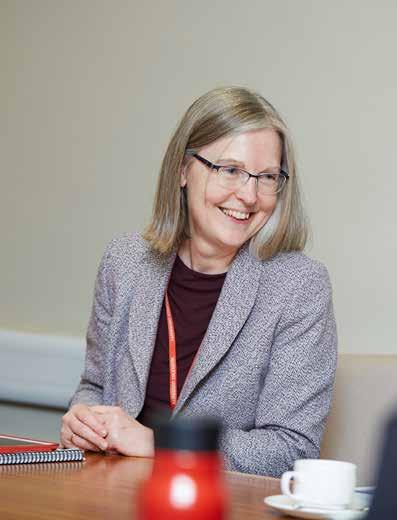
9 minute read
THE OPPORTUNITY BRIDGE
We’ve built a reputation by really “ having a presence there SPOTLIGHT ON MARK POWER AND LIVERPOOL JOHN MOORES UNIVERSITY
OVER THE PAST SEVERAL YEARS, LIVERPOOL JOHN MOORES UNIVERSITY HAS BEEN WORKING TO ATTRACT APPLICANTS FROM NORTHERN IRELAND, A GROUP THAT IS COMMONLY UNDERREPRESENTED AT UNIVERSITIES IN ENGLAND.
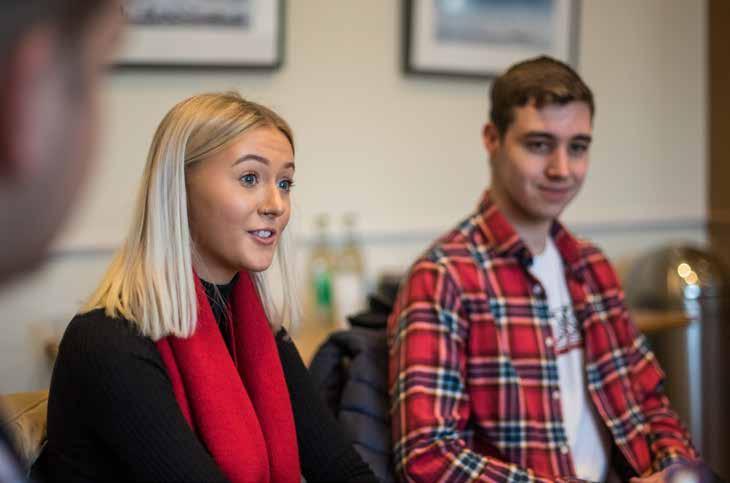
Mark Power, Registrar and Chief Operating Officer at the university, speaks to Justine Greening about its links with Northern Ireland and its ambitious outreach programme. JG // I imaging it’s been a challenging time for you at Liverpool John Moores during the coronavirus crisis?
MP // Definitely. If we look back to March and April, we spent a considerable amount of time moving
from face-to-face delivery to as much online delivery as we possibly could.
We were in a very good position to do that, because we had a very robust digital infrastructure that supported our virtual learning environment.
And I have to say, our academic colleagues were absolutely amazing in moving materials into that online space, delivering synchronous and asynchronous lectures very quickly, and supporting students through the remainder of the academic year. JG// Your Northern Irish students represent just over 10 per cent of the population this year. Can you tell me a little bit about the work that you've been doing in Northern Ireland?
MP// Our links with Northern Ireland go back many years and we've built a reputation by really having a presence there; going out and talking to people in schools and colleges.
Our great ambassadors for the university are our Northern Irish students who have travelled over to Liverpool, studied with us and, in a number of cases, returned to Northern Ireland to build successful careers.
We’re a relatively small team, but we’re dedicated to offering advice, guidance, support and events. We invite parents and supporters of potential applicants to these events so they can see that the Northern Irish population is particularly important to us.
We have seen an increase in both applications and new entrants into the university from Northern Ireland, which is fantastic and goes to show that all of that outreach activity that we’ve undertaken has worked.
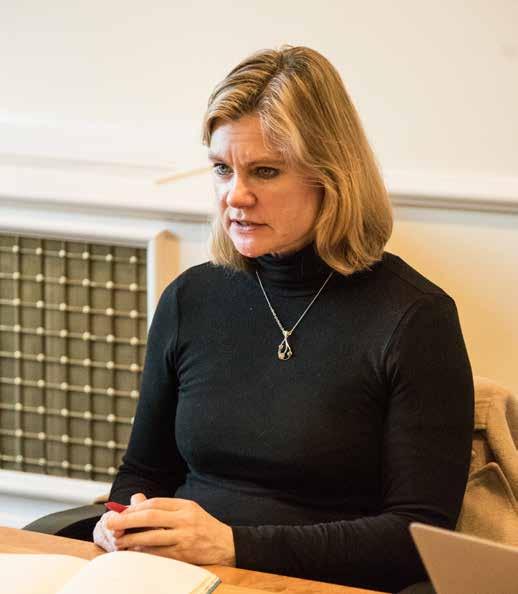
JG// How do you support Northern Irish students once they arrive at university?
MP// It’s about recognising that some of the best mentors for students are fellow students. I work with parts of the Northern Irish student community to provide a buddying infrastructure around the new entrants that arrive in the city.
Also, we recognise that the funding situation in Northern Ireland isn't identical to that of England, and the students are not quite as well supported financially as they are in other parts of the UK. So, we’ve entered into an organisation called UniTemps where we seek to provide students with paid employment opportunities to help support them through their studies.
JG// With COVID-19 taking much of your teaching online, how does that affect your work in Northern Ireland?
MP// We’ve moved all of our outreach work online and the indication is that we've had a greater engagement than we would have done with face-to-face events.
We also moved our summer support sessions online, which we’ve been running for a number of years, in July and August. We recognised that many students haven’t been in the school setting for a considerable amount of time.
Running them online gave an opportunity for applicants who wouldn't have otherwise had the opportunity to travel over to England during July and August to engage with the sessions.
JG// Do you think remote learning and outreach will continue post-pandemic?
MP// I think it certainly will. It has far-reaching implications for how universities think about their investments in their digital infrastructure. And that's something that we've certainly been considering over the last six months; what will the university look like over the next five to ten years and beyond?
But in this time of crisis, it really does focus people's minds. And it's amazing how innovative and creative people can be in those circumstances. For me, that's probably one of the most heartening parts of the last six months; being able to see how colleagues have come together in such a constructive way.
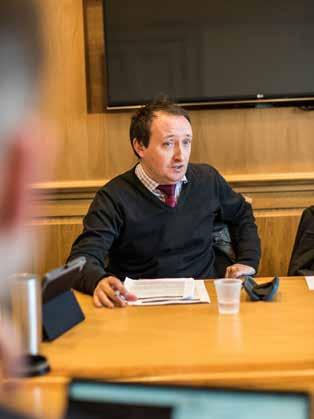
JG// What are some of the challenges you have faced moving your support services online?
MP// One of the challenges is something that is particularly related to the Northern Irish students, who typically do come from lower socioeconomic backgrounds.
We cannot make assumptions that they either have the equipment or access to data. So this year for students from widening participation groups, we have invested around a million pounds in a laptop scheme. We will provide students with their own laptop, as well as buying them data bundles so they can access online materials from wherever they are.
Building bridges
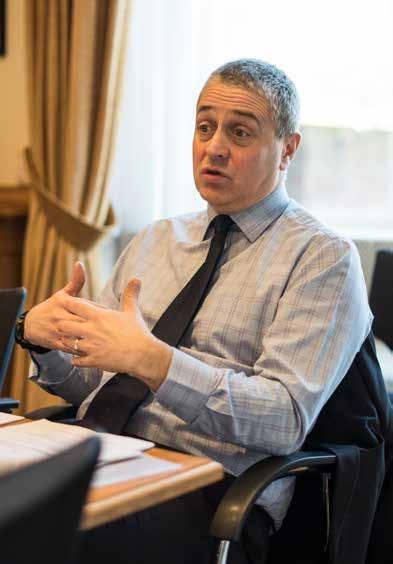
THROUGHOUT ITS LONG HISTORY OF SUPPORTING THE WORKING CLASSES, LIVERPOOL JOHN MOORES UNIVERSITY HAS DEMONSTRATED A FOCUSED AND EMPATHETIC COMMITMENT TO SOCIAL MOBILITY AND INCLUSION, AND ITS APPROACH IS UNIQUELY SHAPED BY THE REGIONS IT SERVES.
Originating as the Liverpool Mechanics’ School of Arts in 1823, the institution was created to support the advancement of the city’s working classes and has continued to drive social mobility for almost 200 years. The team at Liverpool John Moores, led by Registrar and Chief Operating Officer, Mark Power, and vice chancellor and chief executive Professor Ian Campbell, has recognised the nature of social and economic difficulties facing the population in the city of Liverpool. It has developed strong links with the community over many years and is now in a good position to encourage young people with no family experience of higher education to consider it as a well-informed option; offering them the opportunity to improve their own prospects as well as that of their city. It has also successfully built a strong relationship with Northern Ireland, a country which has always had close links with the city of Liverpool. It has sought to understand the barriers that have historically prevented young people in the province from considering university as an option. Its comprehensive support network means that Northern Irish students can fully benefit from their time at university and achieve their full potential. As a result of this concerted outreach work, the university has more students from Northern Ireland than any other higher education institution outside of Northern Ireland itself. Liverpool John Moores University’s approach to its Northern Irish students is a reminder to all organisations that success in unlocking the potential in disadvantaged areas is much harder to achieve with an off-the-shelf approach. It recognises that the nuances of the communities targeted should be carefully considered, and all contextual barriers addressed. Its tailored approach, which considers every element of the student journey and is underpinned by its own research, has shown how successful that can be. The university has also delivered a lesson in patience, in terms of driving real transformation of outcomes in struggling
Liverpool John Moores University has established “ itself as an institution that takes an innovative communities. It recognises that short term fixes are poor substitutes for a thorough, approach to boosting About 100 student advocates are recruited each year as part of longer term approach and the embedded the university’s work to increase social mobility model seen today has, in social mobility employability. Their duties include fact, been two decades in the making. delivering taster sessions and supporting Absolutely essential to the model, through which everything younger students. They are also encouraged to tell their story of else flows, is the symbiotic bond between the university and making the journey from Northern Ireland to Liverpool. schools across Northern Ireland. Both Liverpool and Northern Ireland have been significantly The strategy targeting schools and colleges in Northern Ireland affected as a result of previous recessions, and recovery has been has focused on reaching young people in some of the most slow. The extended economic and social impact has been hugely deprived areas of the region, with a member of staff assigned detrimental to areas which were already home to some of the to each secondary school and college across the province. most disadvantaged communities in the country. In an effort to promote traffic to the university’s stand at the Liverpool John Moores University has taken a well-considered annual Northern Ireland UCAS Exhibition, a series of tours approach to the issue across the board to ensure that young around schools and colleges is scheduled beforehand. In people from these areas are not as likely to be left behind in the 2018/19, the university delivered 142 presentations, reaching aftermath of the coronavirus pandemic and provides resilience to 8,855 prospective students. their communities as a result. As a result of these relationships there is now a near-seamless Students, as well as their schools and parents, are flow from secondary to higher education, ensuring that well-informed about each stage of going to university so they Liverpool John Moores University can tap into the potential in have a much clearer idea of the course that will suit them, what the region and facilitate real change there. will be expected of them, the help that is available for financial, Families which at one time had no graduates in their ranks practical and emotional issues, and finally, of potential are now seeing sons and daughters going off to university, career options. inspiring others in their communities to do the same. This looks The role of student ambassadors, as in normal university life but likely to continue for years to come, since the university has further highlighted during the pandemic, has helped reach out to future-proofed its social mobility approach by closely tracking potential students who value their lived experiences and advice. research findings on the issue and adapting accordingly. Liverpool John Moores University has established itself as an As part of its outreach programmes, the university has a institution that takes an innovative approach to boosting social member of staff assigned to each secondary school and college mobility. It has worked hard to break down the many potential across Northern Ireland to support and provide expertise on barriers that hold back talent and has invested in supporting university related matters throughout the year. both staff and students to reach their potential. In terms of financial support, 42.2 per cent of students from It has also put in place systems and processes to break down Northern Ireland receive a bursary to help fund their higher those barriers, especially around economic disadvantage, education, a significantly higher figure than the 32.5 per cent disability and gender bias. of all students at the university, reflecting the socio-economic It has built bridges that deliver opportunities directly into the demographics of students from this part of the UK. communities that need them most.
UNITED UTILITIES THE UNIVERSITY OF BRADFORD CADENT GAS SAINSBURYS VIRGIN CARE HOGAN LOVELLS DIRECT LINE GROUP STAFFORDSHIRE UNIVERSITY UNIVERSITY OF WEST LONDON TRUE POTENTIAL UNIVERSITY OF LINCOLN MIDDLESEX UNIVERSITY BARRATT DEVELOPMENTS DLA PIPER THE UNIVERSITY OF CENTRAL LANCASHIRE UNIVERSITY OF YORK SSE NORTHERN GAS NETWORKS PERSIMMON HOMES SHOOSMITHS LIVERPOOL JOHN MOORES UNIVERSITY
FIT FOR









